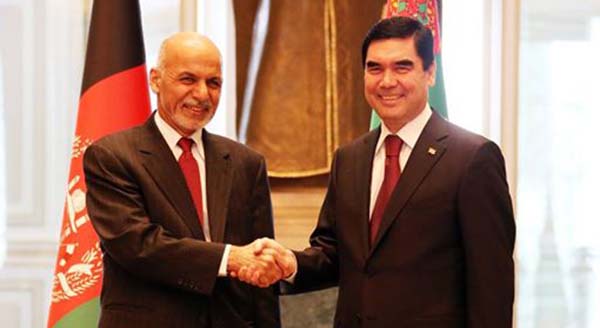Pesident Ashraf Ghani has made visits to countries owing potentials to help out Afghanistan on security and economic fronts. He paid visit to Pakistan to revitalize its resolve undoing the battered relation and work together fighting the menace of terrorism. His visit to Pakistan has led to fruition to certain extent, seeing a joint venture launched against terrorism on the troubled Af-Pak border. Subsequently, he paid a visit to United Arab Emirate, in a bid to earn the confidence of potential investors that would create employment opportunities.
Formerly, Mr. President paid a two-day visit to Turkmenistan which is one of the world's fastest-growing economies. President, Ashraf Ghani and his Turkmen counterpart have stressed the need for cementing economic relations, trade and cultural links between Kabul and Ashgabat. According to concerned official the two premiers hoped that bilateral trade volume between the two neighbors, which stood at $1 billion in 2014, would double this year. The Turkemen president, Berdymukhamedov, renewed his resolve to extend support to peace and stability in Afghanistan and promised continued support for Afghan-led reconciliation
Afghanistan at present is facing extreme power shortages. It relies on imports from its neighbors to meet its needs. The Turkmen premier afforded willingness to export 500 megawatts of power to Afghanistan. It’s indeed a great step ahead, to cope with increasing power demand. In the meanwhile, the Turkmen head of the state, also hinted at plans to construct maternity home in Torghondi district, an orphanage in Jawzjan and two mosques in Aqina and Andkhoi.
Turkmenistan is largely a country with intensive agriculture irrigated areas, and huge gas and oil resources. In terms of natural gas reserves, it is ranked 4th in the world. Regarding agriculture, the two largest crops are cotton, most of which is produced for export, and wheat, which is domestically consumed. A great deal of potential has always existed in Afghanistan-Turkmenistan relations. Being the fourth largest gas reserves; it has been actively on the lookout to build transportation routes to large markets and the route through Afghanistan has been the most feasible and economical. The rise of India as an economic giant and its increasing energy needs make Turkmenistan and Central Asia energy markets of choice for that country and also China.
Gas, oil and electricity are principal imports from Turkmenistan. The Turkmen president said his country wanted to increase energy exports to Afghanistan and was currently working on centre for exporting gas to Afghanistan. Turkmenistan, especially under the new President, is trying to play a small, but positive role in Afghanistan’s development and reconstruction. Ashgabat has delivered humanitarian aid to Afghanistan and forgiven much of Kabul’s debt for Turkmen electrical power. Turkmenistan continues to supply Afghanistan with energy at a deep discount and Ashgabat has reconstructed a portion of the railway that will connect the two countries.
Turkmenistan is rich in natural gas, and currently sells most of its gas to Russia and Ukraine. The Turkmenistan-Afghanistan-Pakistan-India (TAPI) gas pipeline project also came up for discussion at the meeting. Turkmenistan is home to some of the largest undeveloped oil and natural gas fields in the world. Active pipelines exist going west across the Caspian Sea, north through Russia and South across Iran, but what Ashgabat has often wanted is access to India and the markets of Asia, which desperately need Central Asia’s energy supplies to sustain their rapid economic growth. The proposed Trans-Afghan natural gas pipeline, or the TAPI pipeline, named for the four countries that it would pass through (Turkmenistan, Afghanistan, Pakistan and India) would bring natural gas from the Dauletabad gas field in central Turkmenistan along a highway to Herat in eastern Afghanistan and further to Helmand and Kandahar in southern Afghanistan. From there, it would go on to Quetta and Multan in Pakistan, terminating in Fazilka in northern India. The pipeline would be 1,680 km long (of which 735 km are in Afghanistan), and is estimated to bring an annual revenue of over $200 million to Afghanistan, along with the right for the country to use 500 billion cubic meters of natural gas for its own consumption. It is expected the project will bring about 12,000 new jobs to Afghans.
The central Asians and South Asians countries bridged via roads and rails facilitate the fastest business between these countries; it in fact opens the new avenues to financial development. President Ghani stressed a railway line between Afghanistan and Central Asian countries including China, Afghanistan, Pakistan, Iran and Turkmenistan. He believed such a track would pave the ground for spurring regional trade.
Despite a good signs of political and financial progress, the illicit opium trade might affect the brotherly relation of the two countries. Afghanistan is responsible for more than 90 percent of the world’s illicit opium production, and 15 percent of the opiates produced in Afghanistan are smuggled through Central Asia on their way to Russia, Eastern Europe, and China. Furthermore, 20 percent of Afghan heroin, which accounts for more than 90 percent of world supply, is trafficked through Central Asia. However, because of the closed nature of Turkmenistan’s society, it is not known how widespread drug abuse and drug trafficking is there.
The exercise of neutral politics should be the main feature of Afghanistan foreign policy. The incumbent government must prioritize, establishing and continuing a balance relationship with the countries both regional and extra-regional, given it encompasses more gains than harms.

